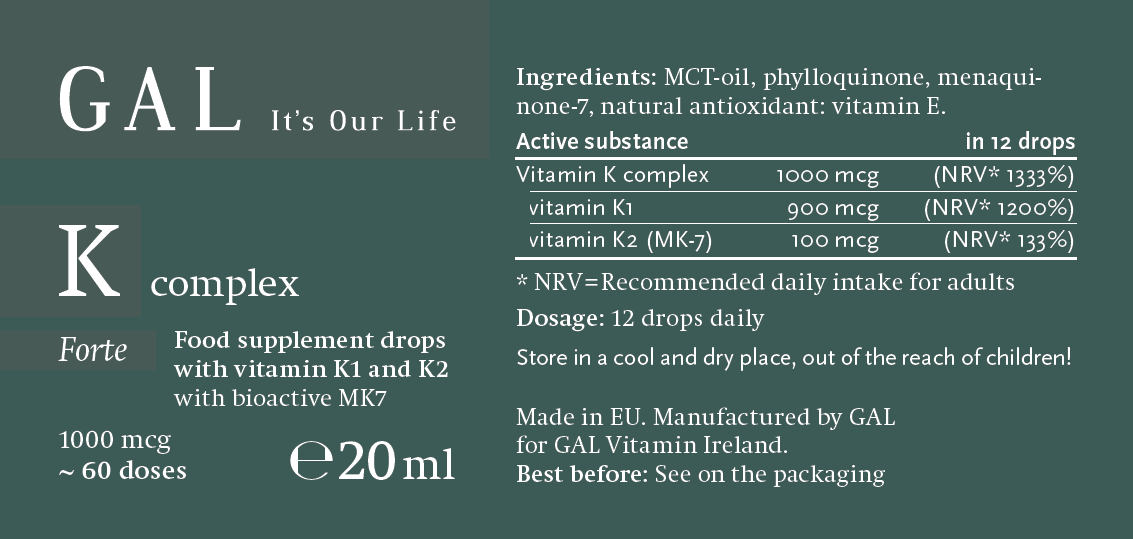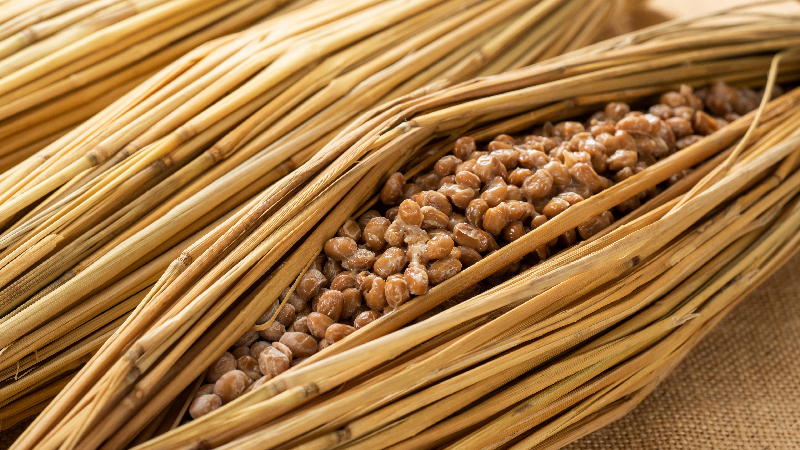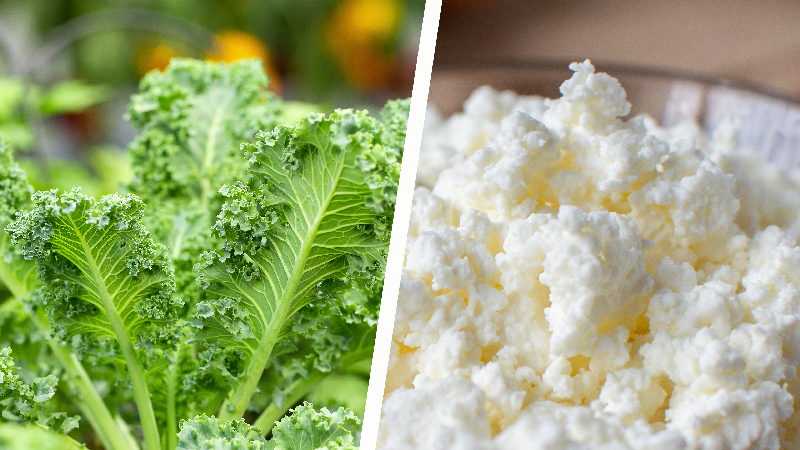
In order to ensure appropriate absorption and stability, our product contains its active substances, that is, vitamin K1 and the soy allergen-free variation of vitamin K2, bioactive MK7 dissolved in RSPO certified palm and coconut oil (orangutan friendly, from a sustainable farm). The GAL K-complex only contains the effective and natural “trans” form of K2 MK-7.
There are different types of vitamin K: K1, K2 and K3. Vitamin K1 is present in leafy green vegetables, while K2 can be found in animal offal (mainly in bone marrow, brain and liver) and fermented natto. Last, vitamin K3 is produced in our body, provided that we consume large amounts of vitamin K1. There are two subtypes of vitamin K2: the so-called menaquinone-4 (MK-4) and menaquinone-7 (MK-7). Both of these have synthetic (cis-) and natural (trans-) forms. The natural form of MK-7 is the best-utilized form.
Why is it important to supplement vitamin K?
Practically everyone lacks vitamin K. Those who eat lots of leafy greens have sufficient vitamin K1 intake, but vitamin K2 is more important. Vitamin K2, however, can be found mainly in the offal, bone marrow and brain of grass-eating animals, and in fermented natto, and we do not consume these in large amounts on a daily basis.
Effects of vitamin K
Historically, there was not any specific importance attributed to vitamin K, as it was seen to play a role only in blood coagulation. Everybody eats enough vegetables to ensure this function, as a small amount of vitamin K1 is already sufficient for this. However, recent observations indicating that vitamin K might have a fundamental role in the prevention of cardiovascular diseases (sclerosis), in the development and maintenance of healthy teeth and bones, in the prevention and reversal of osteoporosis, and also in the prevention and treatment of some tumour diseases. This is especially true for vitamin K2. Although most research studies are currently focusing on osteoporosis and cardiovascular conditions, we can see from current studies that increasing the level of vitamin K3 in the body and administering high doses of vitamin K1 and K2 may have a significant role in the prevention and treatment of cancer, diabetes and Alzheimer’s disease.
Probably the most important role of vitamin K2 in the body is that it can activate proteins responsible for the build-up of calcium where it is needed most (bones and teeth), and not where it is detrimental (soft tissues, kidneys, blood vessels). Scientific studies have confirmed that the occurrence of coronary atherosclerosis and osteoporosis decreases proportionally to vitamin K2 consumption. An insufficiency of vitamin K2 exacerbates calcium intake which can be expressly harmful. With an appropriate vitamin D3 and K2 intake, our bodies receive the requisite amount which is utilized to the greater good. Acknowledging the fact of how beneficial vitamin K2 is for building in calcium and thus for bone development, we can directly conclude how particularly important it is for children.
The following effects can be attributed to vitamin K2 and large-dose vitamin K1, according to scientific studies.
Possible preventing calcium deposition
They might prevent (and according to observations, reverse) cardiovascular sclerosis, just as the sclerotic alterations of other soft tissues and organs (e.g. kidneys).
Teeth and facial structure
K2 and D3 together might prevent and reverse dental calculus, tooth decay, and can even seal smaller dental cavities
(at least the dentin layer). When taken from early childhood, they ensure the development of straight, healthy teeth and a nice, symmetric face. [2,3]
Osteoporosis
They may help to prevent osteoporosis; they are essential for developing a strong, healthy and flexible bone structure.
Alzheimer’s disease
In a study, large doses of vitamin K2 significantly improved the status of patients with Alzheimer’s disease.
Against tumour diseases, High doses both of vitamin K1 and K2 have anti-tumour effects. In a study where cancer patients received large doses of vitamin K1, it resulted in significant status improvement and also inhibited tumour growth. This was presumably due to the elevated vitamin K3 level caused by the high dose of vitamin K1.
Increasing the level of vitamin K3
High doses of vitamin K1 significantly may increase the production of vitamin K3 in the body. Based on current studies, vitamin K3 might be a promising option in cancer treatment.
Our product contains the most active and natural MK-7 form of vitamin K2, and to promote vitamin K3 production, we have also added a large amount of vitamin K1. All these substances are then dissolved in USDA Organic certified extra virgin olive oil, stabilized with a natural vitamin E complex. It does not contain any other additives, and due to being dissolved in oil, it has an excellent absorption rate.
Warnings
KEEP OUT OF REACH OF CHILDREN. DO NOT EXCEED RECOMMENDED DOSE.
If you are undergoing treatment for a medical condition or if you are pregnant or lactating, please consult your medical practitioner before introducing supplementary foods to your normal routine. The dietary supplement should not be used as a substitute for a varied and balanced diet or a healthy lifestyle. Store tightly closed in a cool and dry place.
References:
- http://examine.com/supplements/Vitamin+K/
- Nutrition and Physical Degeneration: A Comparison of Primitive and Modern Diets and Their Effects (1939) Paul B. Hoeber, Inc; Medical Book Department of Harper & Brothers
- Nutrition and Disease – the Interaction of Clinical and Experimental Work (Edinburgh and London: Oliver and Boyd, 1934)
Nutrition and Disease – the Interaction of Clinical and Experimental Work (Edinburgh and London: Oliver and Boyd, 1934)

-Allergen-free
- Glutenfree
- Egg-free
- Soy allergen-free
- Dairy and lactose-free
- Free of sulfur dioxide
- Sugar-free
- GMO-free
- Vegetarian
- Vegan
- FSC paper material (CO31340)
- Packaging from carbon-neutral production
- 100% recyclable packaging
Green: The product has the described property
Red: The product does not have the described property

Brief and precise summary of Calcium
Calcium is an essential dietary mineral and a major component of bones and teeth. An adult human body contains more than 1 kg of calcium, most of which provides for structural functions. It is mainly needed for the firmness of bones, but movement would not be possible without it either. Many other biological processes also require calcium, such as the contraction of muscles and blood vessels and the functioning of the nervous system.
Brief and precise summary of Vitamin K
Vitamin K is an essential fat-soluble vitamin. Scientists first discovered its role in blood coagulation, however later they found it to have many other important functions in our body. It is needed to make sure calcium is transported to the bones and teeth instead of being stored in soft tissues where it can cause major problems.
The True Face of Vitamin K (short version)
What if you found out that plain old vitamin K1 was just as good, maybe even better than the expensive K2, but it happens to be the best-kept secret? Are you familiar with Dumas' Iron Mask story, in which one of two twin princes is hidden in an iron mask while the other reigns supreme? Well, the situation with vitamin K is not unlike that: K1's iron mask is that it only regulates blood clotting and is well hidden from view.
Low vitamin K supplies limit the mobility of the elderly
Vitamin K is not only necessary for healthy bones and the vascular system, but it can keep them flexible, subsequently improving mobility. A new study examined the link between the vitamin K provision of the elderly and their mobility.
Head to Head: Vitamin K1 or K2?
The general recommendation is to get about 100 micrograms of Vitamin K1 from our diet, because this is enough to activate blood clotting. The different types of Vitamin K2, mostly MK-4 and MK-7, have been studied for their beneficial effects on osteoporosis and for the prevention of arterial calcification.
Vitamin K protects the body against cardiovascular diseases
More and more research proves that vitamin K is crucial for the health of the cardiovascular system, as it helps prevent the buildup of calcium deposits in veins. To gain this benefit, however, much more vitamin K is necessary than the currently recommended dietary intake.
Vitamin K1 reduces fracture risk
The ECKO trial looked at 440 postmenopausal women, with low bone mineral density. (1) After menopause, women have double the risk of developing osteoporosis, compared to men. Treatments that improve bone quality, and reduce the risk of developing osteoporosis are especially important for them.







